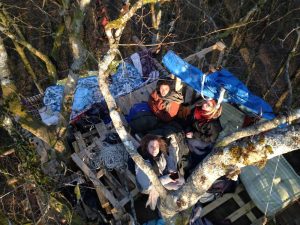On July 18, opponents of the country’s planned underground nuclear waste dump announced that they had routed a small police presence from the contested site in northeast France.
Many people have moved into the place, on the ground as well as in the trees, to reaffirm their opposition to the Cigéo project for radioactive waste burial, to nuclear power and to the industrial, colonial, military world that goes with it. The police forces that occupied this strategic location until then … were forced to leave. From now on, we call for people to come here in Lejuc Forest, as well as in Bure and Mandres-en-Barrois, two villages located two kilometers from the forest.
Lejuc Forest is in the area of the nuclear dumpster project. ANDRA [government nuclear waste agency] plans to clear it to perform archeological digs and drillings, before covering it with concrete to build ventilation shafts. The forest was already occupied twice before, in July 2016 and then from August 15, 2016 to February 22, 2018, when 500 cops evicted the forest and destroyed the houses of the people who were occupying it.
On the site, the repression includes a constant police presence, judicial supervisions, territory bans, house searches and prison sentences. This reoccupation is also an answer to the State repression, reflecting that the local opposition hasn’t been crushed. The State represses and evicts, these past years as always. Bure is no more than one of its laboratories of law enforcement. This July 18, we tried to put it to flight and the cops didn’t have a choice but to withdraw.
… If you want to support us, you can come here, where we need help on the ground, in the trees, in the villages. Whether it be to climb in the trees, build barricades, hold them, bring material, make food, etc., you are welcome. You can also spread this communiqué as widely as possible. If you cannot come, it’s also possible to support us from far away; infrastructures of the nuclear industry and subcontractors working for ANDRA are plentiful.
Within hours of the re-occupation, the prefect authorities had issued two decrees, one prohibiting the carriage and transport of various materials around the neighboring villages, and the other prohibiting movement of pedestrians and vehicles around the Lejuc Forest.
By late afternoon, police had regrouped, fired tear gas into the forest and launched a helicopter for surveillance. At the end of the day, barricades erected by dump opponents were breached. While two people were arrested on the ground, by nightfall several tree-sitters remained above the fray.
The next morning, July 19, police and firefighters arrived with equipment to begin the eviction of activists occupying at least four platforms in the trees. A third prefectural order prohibited the transport and sale of fireworks and other flammables in the region over the next two days.
By the morning of July 20, all of the occupiers had been evicted from the trees. Between police actions in the villages and in the woods, eight people were briefly detained for identification checks, eight others were taken into custody and later released, after being questioned and charged with criminal conspiracy. One person previously barred from the territory, Kevin Fluchs, was arrested and sent to jail for four months for violating this court order. Letters of support can be sent to Fluchs through mid-November to the address listed under Inside and Out.
In recent months, a handful of trials resulting from demonstrations and noncooperation with relentless police ID roadblocks and ID checks around the area ended with fines or dismissals. Reflecting the repressive nature of the atomic state, the courthouse in Bar-le-Duc was surrounded outside, and its stairs and hallways inside were lined by dozens of uniformed police on June 4, when three people were on trial.
On June 20, the Ligue des Droits de l’Homme (League of Human Rights) published a report denouncing the repression and in particular the bias of the Bar-le-Duc court. The courtroom observer wrote that, in 30 years as a lawyer, “… apart from the trials involving terrorists or acts of organized crime, I did not ever feel, both in the neighborhood and in the courthouse and in the courtroom, such a feeling of oppression fueled by the oversized presence of the police, mostly in intervention gear. Such an oppressive police presence is incompatible with the values that underpin the work of justice, including the openness of the proceedings and the serenity of the hearings.”
For more information, visit bureburebure.info (French with English background and legal briefing).
